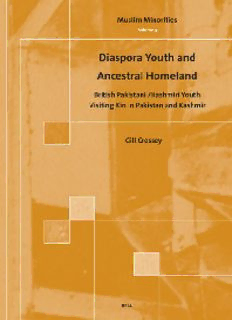
Diaspora Youth and Ancestral Homeland: British Pakistani Kashmiri Youth Visiting Kin in Pakistan and Kashmir (Muslim Minorities) PDF
Preview Diaspora Youth and Ancestral Homeland: British Pakistani Kashmiri Youth Visiting Kin in Pakistan and Kashmir (Muslim Minorities)
DIASPORA YOUTH AND ANCESTRAL HOMELAND MUSLIM MINORITIES EDITORS Jørgen S. Nielsen(University of Birmingham) Felice Dassetto (University of Louvain-la-Neuve) Amira Sonbol (Georgetown University, Washington, DC) VOLUME 5 DIASPORA YOUTH AND ANCESTRAL HOMELAND British Pakistani/Kashmiri Youth Visiting Kin in Pakistan and Kashmir BY GILL CRESSEY LEIDEN•BOSTON 2006 This book is printed on acid-free paper. Library of Congress Cataloging-in-Publication Data Cressey, Gill. Diaspora youth and ancestral homeland : British Pakistani/Kashmiri youth visiting kin in Pakistan and Kashmir / by Gill Cressey. p. cm. — (Muslim minorities, ISSN 1570-7571 ; v. 5) Includes bibliographical references and index. ISBN-13: 978-90-04-15346-2 (hardback : alk. paper) ISBN-10: 90-04-15346-2 (hardback : alk. paper) 1. Pakistanis—Great Britain—Ethnic identity. 2. Kashmiri (South Asian people)— Great Britain—Ethnic identity. 3. Muslim youth—Great Britain. 4. South Asian diaspora. 5. Children of immigrants—Great Britain. 6. Transnationalism. 7. Social role—Great Britain. I. Title. DA125.S57C72 2006 305.891’4122041—dc22 2006049042 ISSN 1570-7571 ISBN-13: 978-90-04-15346-2 ISBN-10: 90-04-15346-2 © Copyright 2006 by Koninklijke Brill NV, Leiden, The Netherlands Koninklijke Brill NV incorporates the imprints Brill, Hotei Publishing, IDC Publishers, Martinus Nijhoff Publishers and VSP. All rights reserved. No part of this publication may be reproduced, translated, stored in a retrieval system, or transmitted in any form or by any means, electronic, mechanical, photocopying, recording or otherwise, without prior written permission from the publisher. Authorization to photocopy items for internal or personal use is granted by Brill provided that the appropriate fees are paid directly to The Copyright Clearance Center, 222 Rosewood Drive, Suite 910 Danvers MA 01923, USA. Fees are subject to change. printed in the netherlands Dedicated to Ali Jaun Adam Kiani and to all of his friends and relations CONTENTS Acknowledgements ...................................................................... ix Introduction ................................................................................ 1 Chapter One Methodology of the Study .............................. 15 Ontology and epistemology .................................................. 15 Gaze ........................................................................................ 16 Discourses and narratives ...................................................... 19 Narrative study of lives .......................................................... 24 Interviews and video diary room .......................................... 25 Young women interviewed 2003 .......................................... 26 Young men interviewed 2003 .............................................. 27 Interview schedule 11th July 2003 ........................................ 28 Interpretation and analysis of stories .................................... 31 Thematic investigation ............................................................ 32 Examples of themes/codes initially identified and later refined .................................................................................. 35 Social research ethics ............................................................ 35 Chapter Two Journeys ............................................................ 41 Translocality ............................................................................ 42 Two-way travelling ................................................................ 44 Going over there: four weddings and a funeral .................. 46 Village: out of sight but not out of mind ............................ 49 Negotiating the borders .......................................................... 50 Change .................................................................................... 53 Chapter Three Homeland ...................................................... 55 Being ‘valayati’: what they think of us ................................ 58 Returning to Britain: back to ‘reality’ .................................. 60 Home from home from home .............................................. 62 Territory: familiar places ........................................................ 64 Chapter Four Race and Nation ............................................ 69 Immigration ............................................................................ 72 Integration and segregation .................................................. 74 viii contents Inclusion and exclusion .......................................................... 76 Nation ...................................................................................... 78 Dual nationality ...................................................................... 80 ‘Race’ ...................................................................................... 82 Immigrant relatives ................................................................ 84 Chapter Five Diaspora ............................................................ 89 Heritage .................................................................................. 95 Degrees of belonging .............................................................. 98 Chain diaspora ........................................................................ 100 Chapter Six Ummah .............................................................. 103 ‘Othering’ of the Oriental Islamic World in the West ...... 103 Muslim subjectivities and Ummah ........................................ 108 Being a Muslim in the West ................................................ 112 Ummah and the current world order .................................. 116 Community: a mixed blessing .............................................. 117 Chapter Seven Gender ............................................................ 121 Gender: it’s a man’s world .................................................... 129 Chapter Eight Kin .................................................................. 139 Biraderi/family: ‘blood, soil, milk and honour’ .................. 146 The price of belonging versus the price of exclusion ........ 149 Chapter Nine Generation and Change .................................. 161 Youth ...................................................................................... 161 Education: missing out .......................................................... 172 Mixing: diverse friendships .................................................... 174 Human Rights ........................................................................ 177 Chapter Ten Language and Cultural Shift .......................... 179 Language: our language ........................................................ 179 Bilingualism and culture ........................................................ 181 Shifting future perspectives .................................................... 187 Conclusion .................................................................................. 191 Bibliography ................................................................................ 211 Index ............................................................................................ 219 ACKNOWLEDGEMENTS Thank you to all of the young people who were interviewed for this study; their open, frank narratives are the heart and soul of this text, without which it would have no life. My household and our extended families have shown great patience, and have given practical and emotional support without which doing this research project would have been impossible. Staff of the former Cultural Studies and Sociology Department of the University of Birmingham have been most supportive of the the- oretical framing of the research, offering on-going constructive crit- icism and feedback; particularly Dr Clive Harris. Subsequently, I gained new insights thanks to Dr Jorgen Nielsen in the Theology Department and gave greater attention to Islamic perspectives. The team of which I am a member within the School of Education, challenged me to keep my integrity as a youth and community worker throughout the research process and rescued me from the tempta- tions of avoiding real issues. All of my colleagues in Community, Youth and Play Studies have been practically supportive, putting up with my obsessive interest in this project valiantly and allowing me space and time to dedicate to writing it up. Thanks to Bal Pooni and young people from Broadway Youth Project for their energy and time spent on video diary work. Muhammad Khan has been an inspiration as a ‘study buddy’. It has been a privilege to be accompanied in the research and writing process by him.
Description: